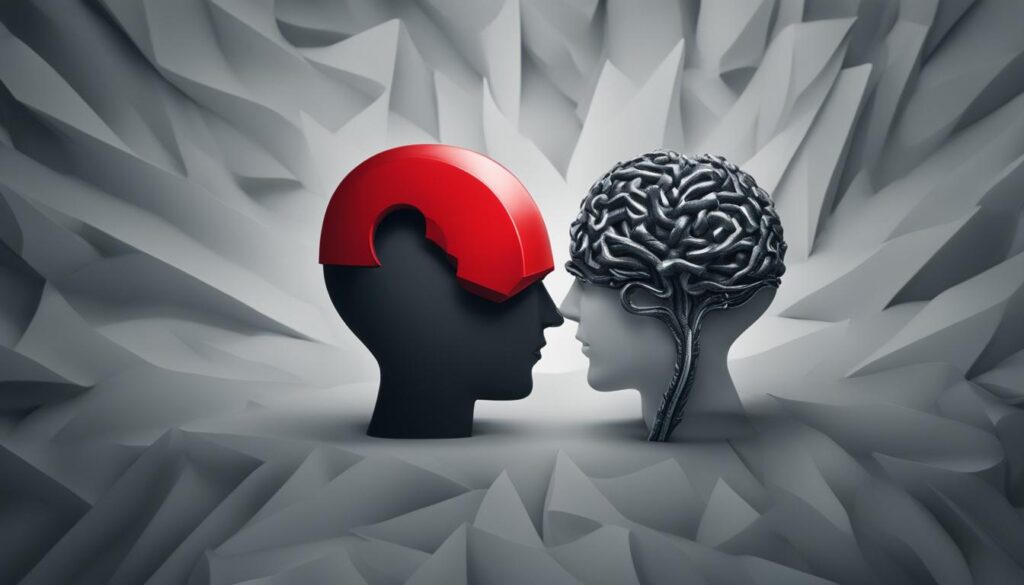Emotional vs. Logical Spending is a concept that revolves around finding a balance between the heart-led purchases driven by emotions and the rational budgeting decisions guided by logic. Research has shown that emotions play a significant role in our spending habits, with up to 90% of our decisions being driven by emotions. However, it is important to maintain a balance between emotion and logic to achieve financial health. This article explores the relationship between emotions and logic in spending and provides insights into how to strike the right balance.
Key Takeaways:
- Emotions and logic are both important factors in decision making and spending.
- Striking a balance between emotion and logic can lead to better financial health.
- Understanding the role of emotions in persuasion and influence is crucial for effective communication.
- Logical fallacies can distort reasoning and lead to flawed decision making.
- Using evidence and critical thinking can enhance decision-making skills.
The Role of Emotions in Persuasion and Influence
Emotions play a crucial role in persuasion and influence. When it comes to convincing others, messages that appeal to emotions are more effective than purely logical or rational ones. Emotions create movement and action, generating energy during a presentation and encouraging prospects to act on the proposal being presented. However, relying solely on emotion can lead to short-term effects and an unbalanced persuasion approach. It is important to strike a balance between logic and emotion to create a persuasive message that resonates with the audience.
According to a study conducted by Harvard Business School, emotional advertising is twice as effective as rational advertising in driving sales. This is because emotions have a profound impact on decision-making. When individuals feel emotionally connected to a product or service, they are more likely to make a purchase. Marketers often tap into emotions such as happiness, fear, or nostalgia to create powerful advertisements that resonate with consumers.
Emotions are the secret weapon of persuasion and influence. They have the ability to capture attention, elicit empathy, and create a memorable experience. By appealing to the emotions of your audience, you can create a deeper connection and increase the likelihood of them taking the desired action.
However, it is important to note that emotions alone are not enough. While emotions can get attention and create initial interest, it is essential to support them with logic and rational arguments. By providing evidence, facts, and logical reasoning, you strengthen your persuasive message and establish credibility. A comprehensive approach that combines both emotion and logic is the key to influencing others effectively.
Research Insight: Emotional Storytelling
One powerful way to leverage emotions in persuasion and influence is through storytelling. By crafting a compelling narrative that engages the audience on an emotional level, you can elicit empathy and create a lasting impact. Research has shown that stories activate multiple areas of the brain, including those associated with emotions and memory, making them highly effective in capturing and retaining attention.
The Power of Logic in Decision Making
Logic serves as the foundation for emotion in decision making. It is the process of drawing conclusions based on evidence and reasoning. Logic allows us to critically evaluate options, analyze pros and cons, and make sound decisions. Research has shown that when people agree with a particular message, they perceive it as more logical or rational, while disagreeing with a message leads to perceiving it as more emotional. However, it is important to note that people may not consistently distinguish between logical and emotional appeals, highlighting the complex interplay between reason and emotion in decision making.
Understanding the power of logic in decision making enables individuals to make informed choices based on objective facts. By utilizing logical thinking, we can examine the evidence and evaluate the validity of arguments, reducing the influence of subjective emotions. This rational approach allows for a clearer understanding of the potential outcomes and consequences of decisions. It also helps to minimize biases and faulty reasoning, ensuring that decisions are based on sound judgment.
Logic is the tool that allows us to navigate the complexities of decision making. It helps us make choices that are in line with our goals and values, rather than being swayed solely by emotions. By relying on logic, we can overcome impulsive and irrational tendencies and make decisions that align with long-term objectives.
Incorporating logic into decision making involves weighing the pros and cons, considering different perspectives, and analyzing the potential risks and benefits. This process enables individuals to make more thoughtful and well-rounded decisions, taking into account both the emotional and logical aspects of the situation. By finding the right balance between emotion and logic, we can make informed choices that lead to positive outcomes.
| Emotion | Logic |
|---|---|
| Driven by subjective feelings | Based on evidence and reasoning |
| Can cloud judgment | Provides clarity and objectivity |
| May lead to impulsive decisions | Promotes thoughtful analysis |
Understanding Logical Fallacies in Decision Making
Logical fallacies are common errors in reasoning that can undermine the decision-making process. These fallacies often appear in arguments and can lead to flawed conclusions if not recognized and avoided. By understanding and identifying these fallacies, individuals can improve their critical thinking skills and make more informed decisions.
In decision making, logical fallacies can manifest in various forms. One common fallacy is the faulty cause, where a causal relationship is incorrectly assumed between two events. For example, assuming that because Event A happened before Event B, Event A must have caused Event B. This fallacy ignores other possible causes and can lead to inaccurate conclusions.
Another fallacy is the sweeping generalization, where a general statement is applied to all individuals or situations without considering relevant exceptions or variations. This fallacy oversimplifies complex issues and can lead to biased or unfair judgments. It is important to recognize that generalizations rarely hold true in every circumstance and to consider the unique characteristics of each situation.
“A logical fallacy is like a slip-up in the reasoning process. It’s important to be aware of these fallacies because they can distort our thinking and ultimately lead to poor decision making.” – John Smith, logic expert
One more common fallacy is the appeal to authority, where the credibility of a source is used as the sole basis for accepting a claim. This fallacy disregards the need for critical evaluation and independent thinking. While expert opinions can provide valuable insights, it is essential to consider multiple perspectives and evaluate the evidence supporting a claim.
| Fallacy | Description |
|---|---|
| Faulty Cause | Incorrectly assuming a cause-and-effect relationship between two events. |
| Sweeping Generalization | Applying a general statement to all individuals or situations without considering exceptions or variations. |
| Faulty Analogy | Using an analogy that is not truly comparable to the situation being discussed. |
| Appeal to Authority | Relying solely on the credibility of the source to accept a claim without critical evaluation. |
By familiarizing ourselves with logical fallacies and actively avoiding them in our decision-making process, we can enhance our reasoning abilities and make more thoughtful choices. Critical thinking, careful evaluation of evidence, and a willingness to challenge assumptions are key in overcoming these fallacies and making informed decisions.

The Importance of Evidence and Logic
Evidence and logic are fundamental aspects of decision-making and critical thinking. By relying on objective facts and sound reasoning, individuals can make informed choices that lead to desirable outcomes. The combination of evidence and logic provides a solid foundation for establishing credibility, supporting arguments, and avoiding the pitfalls of emotional decision-making.
When it comes to decision-making, evidence plays a crucial role in shaping perceptions and influencing outcomes. Strong evidence, such as well-researched statistics, expert testimony, and real-life examples, enhances the credibility of an argument and increases its persuasiveness. By presenting relevant evidence, individuals can demonstrate the validity of their claims and provide a compelling basis for their decisions.
Logic, on the other hand, allows individuals to analyze information, assess the pros and cons, and draw logical conclusions. It helps in identifying fallacies, eliminating biases, and uncovering the truth. By applying logical reasoning, individuals can avoid hasty judgments, faulty generalizations, and other cognitive biases that may distort the decision-making process.
| Evidence | Logic |
|---|---|
| Strengthens arguments | Guides rational thinking |
| Enhances credibility | Avoids cognitive biases |
| Supports decision-making | Promotes sound judgments |
By combining evidence and logic, individuals can make well-informed decisions that are grounded in reality and free from the influence of subjective emotions. This balanced approach allows for a thorough examination of all relevant factors and ensures that decisions are based on objective facts and sound reasoning.
As the famous philosopher Aristotle once said, “It is the mark of an educated mind to be able to entertain a thought without accepting it.” By embracing evidence and logic, individuals can cultivate a mindset that values critical thinking, objective analysis, and rational decision-making. In a world that is often driven by emotions, the importance of evidence and logic cannot be overstated.
The Concept of Wise Mind in Balancing Emotion and Logic
When it comes to making decisions, finding a balance between emotion and logic is crucial. This is where the concept of Wise Mind comes into play. Derived from Dialectical Behavior Therapy (DBT), Wise Mind represents the integration of both emotional and logical thinking. It allows individuals to achieve clarity and make practical decisions by balancing their emotional responses with logical thinking.
Wise Mind recognizes that both emotion mind and reasonable mind have their role to play. Emotion mind is driven by heightened emotions and can lead to impulsive and self-destructive actions. On the other hand, reasonable mind is ruled by logic and critical thinking. By combining these two aspects, individuals can experience emotions without being overwhelmed by them and use logic to make balanced and informed decisions.
Wise mind allows individuals to tap into their emotional intelligence while also considering the practicality of their actions. It is about finding a middle ground between following our hearts and using our heads.
To illustrate the importance of Wise Mind, let’s consider an example. Imagine someone is buying a car. Emotion mind might be drawn to a flashy sports car due to the excitement it evokes. However, reasonable mind may recognize the importance of practicality and consider factors such as fuel efficiency and maintenance costs. By engaging Wise Mind, the individual can find a balance between their desires and practical considerations, perhaps opting for a reliable and fuel-efficient sedan that combines both emotional appeal and logical decision-making.
Table: Wise Mind in Action
| Emotion Mind | Reasonable Mind | Wise Mind |
|---|---|---|
| Driven by heightened emotions | Ruled by logic and critical thinking | Balance between emotions and logical thinking |
| May lead to impulsive actions | Focused on practicality | Practical decisions based on emotional and logical factors |
| Can be overwhelming | May overlook emotional aspects | Integration of emotional intelligence and practicality |
By cultivating Wise Mind, individuals can navigate the complexities of decision-making, bringing together their emotional intelligence and logical thinking. This integration leads to well-informed choices that consider both personal desires and practical considerations. Whether it’s financial decisions, career choices, or personal relationships, finding balance through Wise Mind allows for a more holistic and fulfilling approach to life.

Developing Practical Wisdom with DBT
Dialectical Behavior Therapy (DBT) offers valuable techniques to help individuals manage complex emotions and develop practical wisdom. By incorporating elements of emotional regulation and logical thinking, DBT provides a framework for finding balance and making informed decisions.

One of the key aspects of DBT is the cultivation of self-awareness. Through practices like mindfulness and breathwork, individuals can shift their focus from emotional reactivity to a more grounded state of mind. This heightened awareness allows individuals to observe their thoughts non-judgmentally and describe their experiences without attaching value or judgment.
By practicing present-moment awareness, individuals can develop greater clarity in their decision-making processes. This clarity stems from the ability to recognize and regulate emotions effectively, ensuring that decisions are not solely driven by impulsive or emotional responses.
Furthermore, DBT emphasizes the integration of emotional and logical thinking, often referred to as wise mind. This approach combines the wisdom of emotion mind, which recognizes and respects emotions, with the rationality of reasonable mind, which prioritizes logical thinking and critical analysis. By incorporating both emotional and logical factors, individuals can make practical decisions that align with their values and goals.
Benefits of Developing Practical Wisdom with DBT
By applying the principles of DBT and developing practical wisdom, individuals can experience a range of benefits:
- Enhanced emotional regulation: The techniques taught in DBT help individuals gain greater control over their emotions, allowing for more balanced and effective decision-making.
- Improved self-awareness: Through mindfulness and non-judgmental observation, individuals can develop a deeper understanding of their thoughts, feelings, and behavioral patterns.
- Increased clarity in decision-making: By integrating emotional and logical factors, individuals can make decisions that align with their values, needs, and long-term goals.
- Reduced impulsive behavior: DBT techniques assist individuals in managing impulsive tendencies, reducing the likelihood of engaging in harmful or regrettable actions.
Overall, developing practical wisdom with DBT offers a comprehensive approach to balancing emotional regulation and logical thinking. By practicing self-awareness and integrating emotional and logical factors, individuals can make well-informed decisions that promote their overall well-being and personal growth.
Tapping into Logic and Dialectical Thinking
When it comes to making decisions, tapping into logic and dialectical thinking is essential. Logic allows us to examine the facts objectively and uncover the truth, while dialectical thinking helps us challenge false beliefs and embrace the concept of two diverse ideas coexisting in the same reality. By integrating these two approaches, individuals can make balanced and practical decisions.
In order to tap into logic and dialectical thinking, it is important to consider the objective truth. This means avoiding confirmation bias and approaching each situation with an open mind. By critically analyzing the available information and considering different perspectives, we can arrive at a more well-rounded understanding of the situation.
“The truth is rarely pure and never simple.” – Oscar Wilde
Integrating rational thinking with emotional concerns is another key aspect of tapping into logic and dialectical thinking. While logic provides a solid foundation for decision making, emotions also play a role in our experiences and perceptions. By acknowledging and addressing our emotions, we can ensure that our decisions are grounded in both reason and empathy.
By combining logic and dialectical thinking, individuals can navigate complex situations with clarity and make informed choices. This balanced approach allows us to consider both the rational and emotional aspects of a decision, leading to better outcomes and increased personal fulfillment.

Example Table: Comparing Logic and Emotion
| Logic | Emotion | |
|---|---|---|
| Guiding Principle | Objective reasoning | Subjective feelings |
| Decision Making | Based on evidence and analysis | Influenced by personal preferences |
| Strengths | Consistency and rationality | Passion and intuition |
| Limitations | May lack empathy and understanding | Can be influenced by bias and irrationality |
Rational Thinking and Emotions Working Together
Rational thinking and emotions are often seen as opposing forces, but they can actually work together harmoniously to make informed decisions. While emotions are often considered impulsive and irrational, they play an important role in our decision-making process. By integrating emotions into our thinking without being controlled by them, we can achieve a balance between emotion and logic.
When it comes to decision-making, rational thinking allows us to examine the facts objectively and intellectualize our feelings. It provides us with a framework for critical analysis and helps us weigh the pros and cons of different options. Emotions, on the other hand, provide us with valuable insights and intuition that can guide our decision-making process.
“Logic will get you from A to B. Imagination will take you everywhere.” – Albert Einstein
By acknowledging and embracing our emotions, we can tap into our intuition and make decisions that align with our values and goals. Emotions can provide us with unique perspectives and help us connect with our desires and passions. Rational thinking acts as a check and balance, ensuring that our decisions are not solely driven by emotion but also grounded in reason.
The key to balancing emotion and logic lies in self-awareness and self-regulation. By understanding our emotional triggers and patterns, we can make conscious choices rather than being driven solely by our emotions. This allows us to make thoughtful decisions that consider both our emotional needs and logical considerations.
Captions:
- Image: An illustration of a person holding a scale, representing the balance between emotion and logic in decision making.
Table: Emotion versus Logic
| Emotion | Logic |
|---|---|
| Provides insights and intuition | Allows for critical analysis |
| Can be impulsive and irrational | Provides a framework for reasoning |
| Connects us with desires and passions | Acts as a check and balance |
| Guides decision-making process | Helps weigh pros and cons |
Conclusion
Striking a balance between emotional and logical spending is crucial for achieving financial health and making effective decisions. Emotions play a significant role in persuasion and influence, while logic provides a foundation for sound reasoning. By understanding logical fallacies, using evidence and critical thinking, and developing practical wisdom through techniques like Dialectical Behavior Therapy (DBT), individuals can integrate rational thinking and emotional awareness to make well-informed decisions.
It is important to acknowledge that emotions have a powerful impact on our spending habits, with up to 90% of our decisions being driven by emotions. However, relying solely on emotion can lead to impulsive and unwise choices. By incorporating logical reasoning into the decision-making process, individuals can ensure that their choices are based on sound judgment and objective facts. This requires examining options critically, analyzing pros and cons, and being aware of common logical fallacies that can distort the decision-making process.
Developing practical wisdom through techniques like DBT can help individuals manage complex emotions and achieve a balance between the heart-led purchases driven by emotions and the rational budgeting decisions guided by logic. By integrating emotional responses with logical thinking, individuals can experience emotions without being overwhelmed by them and make practical decisions that align with their long-term goals.
By finding the right balance between emotional and logical spending, individuals can achieve financial well-being and navigate life’s challenges with clarity and confidence. It is through the integration of rational thinking and emotional awareness that we can make choices that are grounded in logic, while still honoring and acknowledging the role of emotions in our lives.
FAQ
What is emotional spending?
Emotional spending refers to making purchases driven by emotions rather than logical budgeting decisions. It is when individuals rely on their feelings or desires in the moment instead of considering the long-term financial impact.
How much do emotions affect our spending habits?
Research suggests that up to 90% of our spending decisions are driven by emotions. Emotions play a significant role in our purchasing behavior, influencing what we buy and how much we are willing to spend.
Why is it important to strike a balance between emotion and logic in spending?
Striking a balance between emotion and logic in spending helps achieve financial health. While emotions can be powerful motivators, they can also lead to impulsive and potentially harmful financial decisions. Logic and rational thinking provide a foundation for making sound and informed choices.
What are logical fallacies in decision making?
Logical fallacies are errors in reasoning that can distort the decision-making process. Some examples include faulty cause, sweeping generalization, faulty analogy, and appeal to ignorance. Being aware of these fallacies helps individuals avoid flawed conclusions and make better decisions.
How does evidence and logic contribute to decision making?
Evidence and logic are essential components of a logical decision-making process. Strong evidence, such as testimony, statistics, analogies, and examples, enhances credibility and makes arguments more persuasive. By using reasoning backed by evidence, individuals can make informed decisions based on objective facts rather than subjective emotions.
What is Wise Mind in balancing emotion and logic?
Wise Mind is a concept derived from Dialectical Behavior Therapy (DBT) that represents the integration of both emotion mind and reasonable mind. It involves balancing emotional responses with logical thinking to achieve clarity and make practical decisions.
How can DBT help in developing practical wisdom?
DBT provides techniques for managing complex emotions and developing practical wisdom. By practicing breathwork, mindfulness, and self-awareness, individuals can shift their focus from emotional reactivity to logical reasoning. DBT helps cultivate emotional regulation and balance emotion mind with reasonable mind.
What is the importance of tapping into logic and dialectical thinking?
Tapping into logic and dialectical thinking involves examining the facts objectively and challenging false beliefs. By integrating rational thinking with emotional concerns, individuals can make balanced and practical decisions. It allows for the coexistence of two diverse ideas in the same reality.
How can rational thinking and emotions work together in decision making?
Rational thinking and emotions can work together to make informed decisions. Rather than judging emotions as good or bad, individuals can integrate them into life without being overwhelmed. Rational thinking allows for objective examination of facts and intellectualizing feelings without impulsive actions. Balancing emotion and logic leads to well-informed decisions.
Why is balancing emotion and logic important in achieving financial health?
Balancing emotion and logic is crucial in achieving financial health and making effective decisions. Emotions play a significant role in persuasion and influence, while logic provides a foundation for sound reasoning. By striking a balance, individuals can make well-informed decisions that take into account both emotions and logical factors.
How Can Budgeting for Mental Wellness Help Me Balance Emotion and Logic in Spending?
Budgeting for mental wellness can be a powerful tool to strike a balance between emotion and logic in our spending habits. By implementing a structured financial plan, we give ourselves the mental freedom to make healthier financial choices. This approach ensures that our emotions don’t override our logical thinking when it comes to financial decisions. Budgeting for mental wellness offers a practical and effective way to prioritize our emotional well-being while still maintaining financial stability.

